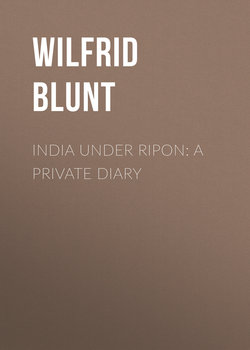India Under Ripon: A Private Diary

Реклама. ООО «ЛитРес», ИНН: 7719571260.
Оглавление
Blunt Wilfrid Scawen. India Under Ripon: A Private Diary
CHAPTER I. INTRODUCTORY
CHAPTER II. CEYLON
CHAPTER III. MADRAS
CHAPTER IV. HYDERABAD
CHAPTER V. CALCUTTA
CHAPTER VI. A MOHAMMEDAN UNIVERSITY
CHAPTER VII. PATNA, LUCKNOW
CHAPTER VIII. DELHI, RAJPUTANA
CHAPTER IX. THE NIZAM’S INSTALLATION
CHAPTER X. BOMBAY
CHAPTER XI. AN APOLOGY FOR FAILURE
CHAPTER XII. THE AGRICULTURAL DANGER
CHAPTER XIII. RACE HATRED
CHAPTER XIV. THE MOHAMMEDAN QUESTION
CHAPTER XV. THE FUTURE OF SELF-GOVERNMENT20
APPENDIX I. THE MOHAMMEDAN UNIVERSITY
APPENDIX II. Sir William Hunter to Mr. Blunt
APPENDIX III. Major Claude Clerk to Mr. Blunt
Отрывок из книги
“Left home by the 10 o’clock train, and spent the day in London. A letter had come from Eddy Hamilton by the morning’s post asking to see me before I went abroad, and I went to Downing Street at one o’clock. Mr. Gladstone is away yachting, and Eddy is acting Prime Minister, and a very great man. I had not been to Downing Street since last year – just upon a year ago – when I went to ask for Arabi’s life. Eddy was extremely amiable this time, and asked me what I was going to do in the East. I told him my plans exactly – that I was going first to Egypt, and should call on Baring and, if I found him favourably disposed, should propose to him a restoration of the National Party, but if he would not listen I should go on to Ceylon and India; that I could not do anything in Egypt without Baring’s countenance, for the people would not dare to come to speak to me; but, if Baring would help, I thought I could get the Nationalist leaders elected at the elections – all depended on the action of our officials. Also as to India – that I had no intention of exciting to rebellion; that I should go first to Lord Ripon, then to Lyall, and afterwards to the provinces; that the subjects I wished principally to study were the financial condition of the country, that is to say, to find out whether our administration was really ruining India, and to ascertain the views of the natives with regard to Home Rule. Of both these plans Eddy seemed to approve, said that Baring would be sure to wish to see me, and listen to all I had to say, and, though he did not commit himself to anything very definite about the rest, did not disapprove. With regard to India, he said he would write to Primrose, Lord Ripon’s private secretary, to show me all attention; so on the whole I am highly satisfied with my visit. I had some talk with Eddy about Randolph Churchill. He said that my connection with him in Egyptian affairs did me harm, but I don’t believe that, and I look upon Churchill as quite as serious a politician as the rest with whom I have had to deal. On Egypt I think he is sincere, because he has an American wife, and the Americans have always sympathized with freedom there. I believe, too, that he is at a turning point in his character, and means to have done with mere random fighting, and we both agreed that he has a career before him. For my own part I like Churchill. He does not affect any high principles, but he acts squarely.”
The next day I left with my wife for Paris, where our principal interest was to see the small group of Egyptian exiles congregated there.
.....
“11th Nov.– We bade good-bye to our friends, and took steamer for Tuticorin, the southernmost point of the Indian peninsula. The night before I had a serious talk with Mahmud Sami. He is a man of a very superior education, and has behaved to us throughout as our host with the most consummate courtesy. Immediately after breakfast came some other chief friends among the Moors, with them Haj Ibrahim Didi, the Sultan of Maldive’s nephew, who is also Consul for him, though the Maldive Islands are so cut off from the mainland that he has had no communication with head-quarters for years. The Pashas came on board to see us off, and I embraced each one of them as they went over the ship’s side, and, last of all, Arabi, for whom I feel a true affection. In spite of faults and failings, there is something great about him which compels one’s respect. His faults are all the faults of his race, his virtues are his own.
“Looking back on the last three weeks spent in Ceylon, I recognize in them perhaps the happiest of my life. When I arrived I was so weak I could have died happily. But, though I did not die, I have had such satisfaction as seldom comes on earth, that of seeing the bread one has cast on the waters return to one a hundredfold, a feeling that at last the power to do good has been won, and more than one’s wishes granted. This is true pleasure and true happiness. I regret the quiet life at Mahmud Sami’s as I regret a home. We could see the banyan tree in the garden, and the boats on the shore, and the columns of the verandah as we steamed away. I doubt whether I shall ever be happier than I have been there.”
.....